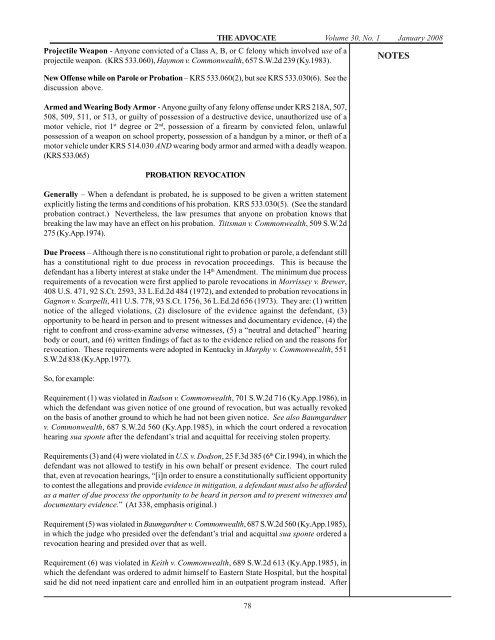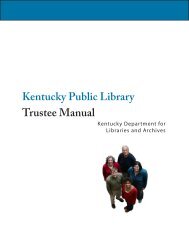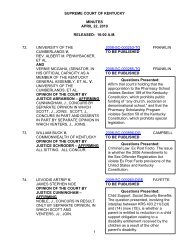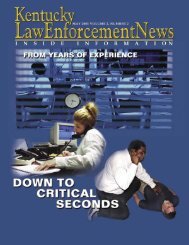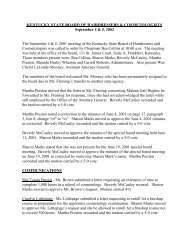Jan08 Advo.pmd - e-archives Home
Jan08 Advo.pmd - e-archives Home
Jan08 Advo.pmd - e-archives Home
Create successful ePaper yourself
Turn your PDF publications into a flip-book with our unique Google optimized e-Paper software.
THE ADVOCATE Volume 30, No. 1 January 2008<br />
Projectile Weapon - Anyone convicted of a Class A, B, or C felony which involved use of a<br />
projectile weapon. (KRS 533.060), Haymon v. Commonwealth, 657 S.W.2d 239 (Ky.1983).<br />
New Offense while on Parole or Probation – KRS 533.060(2), but see KRS 533.030(6). See the<br />
discussion above.<br />
Armed and Wearing Body Armor - Anyone guilty of any felony offense under KRS 218A, 507,<br />
508, 509, 511, or 513, or guilty of possession of a destructive device, unauthorized use of a<br />
motor vehicle, riot 1 st degree or 2 nd , possession of a firearm by convicted felon, unlawful<br />
possession of a weapon on school property, possession of a handgun by a minor, or theft of a<br />
motor vehicle under KRS 514.030 AND wearing body armor and armed with a deadly weapon.<br />
(KRS 533.065)<br />
PROBATION REVOCATION<br />
Generally – When a defendant is probated, he is supposed to be given a written statement<br />
explicitly listing the terms and conditions of his probation. KRS 533.030(5). (See the standard<br />
probation contract.) Nevertheless, the law presumes that anyone on probation knows that<br />
breaking the law may have an effect on his probation. Tiitsman v. Commonwealth, 509 S.W.2d<br />
275 (Ky.App.1974).<br />
Due Process – Although there is no constitutional right to probation or parole, a defendant still<br />
has a constitutional right to due process in revocation proceedings. This is because the<br />
defendant has a liberty interest at stake under the 14 th Amendment. The minimum due process<br />
requirements of a revocation were first applied to parole revocations in Morrissey v. Brewer,<br />
408 U.S. 471, 92 S.Ct. 2593, 33 L.Ed.2d 484 (1972), and extended to probation revocations in<br />
Gagnon v. Scarpelli, 411 U.S. 778, 93 S.Ct. 1756, 36 L.Ed.2d 656 (1973). They are: (1) written<br />
notice of the alleged violations, (2) disclosure of the evidence against the defendant, (3)<br />
opportunity to be heard in person and to present witnesses and documentary evidence, (4) the<br />
right to confront and cross-examine adverse witnesses, (5) a “neutral and detached” hearing<br />
body or court, and (6) written findings of fact as to the evidence relied on and the reasons for<br />
revocation. These requirements were adopted in Kentucky in Murphy v. Commonwealth, 551<br />
S.W.2d 838 (Ky.App.1977).<br />
So, for example:<br />
Requirement (1) was violated in Radson v. Commonwealth, 701 S.W.2d 716 (Ky.App.1986), in<br />
which the defendant was given notice of one ground of revocation, but was actually revoked<br />
on the basis of another ground to which he had not been given notice. See also Baumgardner<br />
v. Commonwealth, 687 S.W.2d 560 (Ky.App.1985), in which the court ordered a revocation<br />
hearing sua sponte after the defendant’s trial and acquittal for receiving stolen property.<br />
Requirements (3) and (4) were violated in U.S. v. Dodson, 25 F.3d 385 (6 th Cir.1994), in which the<br />
defendant was not allowed to testify in his own behalf or present evidence. The court ruled<br />
that, even at revocation hearings, “[i]n order to ensure a constitutionally sufficient opportunity<br />
to contest the allegations and provide evidence in mitigation, a defendant must also be afforded<br />
as a matter of due process the opportunity to be heard in person and to present witnesses and<br />
documentary evidence.” (At 338, emphasis original.)<br />
Requirement (5) was violated in Baumgardner v. Commonwealth, 687 S.W.2d 560 (Ky.App.1985),<br />
in which the judge who presided over the defendant’s trial and acquittal sua sponte ordered a<br />
revocation hearing and presided over that as well.<br />
Requirement (6) was violated in Keith v. Commonwealth, 689 S.W.2d 613 (Ky.App.1985), in<br />
which the defendant was ordered to admit himself to Eastern State Hospital, but the hospital<br />
said he did not need inpatient care and enrolled him in an outpatient program instead. After<br />
78<br />
NOTES


